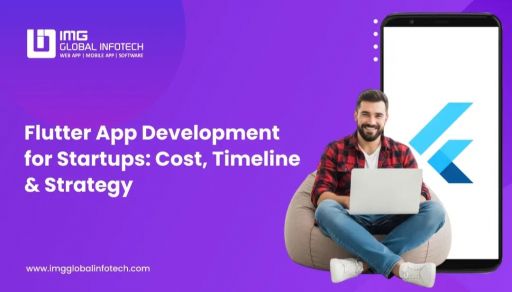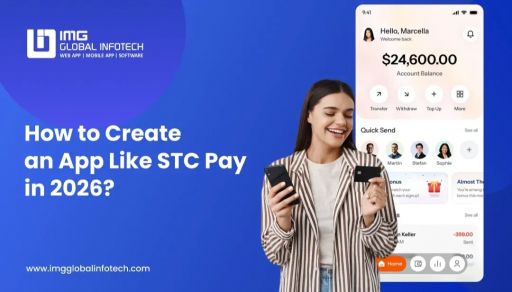A Complete Guide To Healthcare App Development In 2026
Dipti Singhal
Oct 25, 2021

The digital transformation in healthcare isn’t just a trend anymore it’s a must. For Chief Technology Officers (CTOs), understanding how to build a successful healthcare app is key to staying ahead in this fast-changing industry.
Whether your goal is to improve how patients interact with your services, make administrative tasks easier, or enhance telehealth solutions, having a clear app development plan is essential.
There’s huge potential for innovation. Think AI-based diagnostic tools, real-time health tracking, or smart wearables that monitor patients 24/7. Even big data can be used to offer personalized care like never before.
This healthcare app development guide will help you make smart, confident decisions and lead your organization through a successful digital shift.
Market Overview of Healthcare App Development
The healthcare app industry is growing rapidly as more patients and medical professionals turn to digital solutions. According to Market Data Forecast, the global patient-focused healthcare app market is expected to grow from $8 billion in 2023 to $367 billion by 2028, with a strong annual growth rate (CAGR) of 35.20%.
This growth is driven by the rising need for smart, easy-to-use health solutions. With more people relying on smartphones for managing their health, developers are continuously improving app quality and features to meet this demand.
Both government initiatives and private sector investments are also supporting this trend, encouraging more users and developers to join the healthcare app space. As a result, the market offers a huge opportunity for startups, healthcare providers, and tech companies looking to build profitable and impactful digital health solutions.
What is Healthcare App Development?
Healthcare Software Development is the process of designing and building mobile or web applications specifically for the medical and healthcare industry. These apps are created to improve patient care, make health services more efficient, and provide timely medical support.
The main goals of healthcare app development include:
-
Enhancing patient engagement through easy access to health data and services
-
Speeding up healthcare delivery and reducing wait times
-
Supporting accurate diagnosis and treatment using smart technologies
-
Boosting operational efficiency for clinics, hospitals, and healthcare providers
These apps also support remote monitoring and telemedicine, allowing doctors to connect with patients virtually. This helps healthcare providers serve more people, especially in remote areas, while offering personalized and convenient care.
Related Post - Cost To Build A Medicine Delivery App Like 1mg
Difference Between Healthcare Applications and Medical Applications
For Chief Technology Officers (CTOs) exploring digital health solutions, it’s important to understand the difference between healthcare applications and medical applications. While these terms are often used interchangeably, they serve different goals and audiences in the healthcare sector.
As part of this healthcare app development guide, let’s break down the key distinctions:
Healthcare Applications
Healthcare apps cover a wide range of services designed to improve how patients, providers, and administrative teams interact. These apps aim to:
-
Simplify appointment booking
-
Manage billing and insurance claims
-
Store and access electronic health records (EHRs)
-
Boost patient engagement and communication
Examples:
Appointment scheduling apps, EHR systems, insurance management platforms.
Goal:
Improve operational efficiency and streamline communication across the entire healthcare process.
Medical Applications
Medical apps are more clinical and professional. They are built to support doctors, nurses, and medical staff in making accurate, data-driven medical decisions. These apps focus on:
-
Assisting in diagnosis
-
Providing drug information
-
Offering medical calculators and tools
Examples:
Drug reference apps, diagnostic support tools, medical calculators.
Goal:
Support accurate diagnosis, treatment planning, and informed clinical decisions.
Understanding these differences helps CTOs and businesses choose the right type of app based on their target audience and business goals. A healthcare application may be ideal for clinics or hospitals looking to improve operations, while a medical application is more suitable for tools supporting clinical decision-making.
Choosing the right approach from the start will help ensure your digital health product is both effective and successful in the long run.
Also Read - On-Demand App Development: An Ultimate Guide
Top Successful Healthcare Applications
The rapid rise of healthcare apps has significantly transformed how patients connect with doctors, access care, and manage their health. Digital health tools have brought convenience, speed, and personalization into the medical space, making it easier for users to take control of their well-being.
From virtual consultations to mental wellness support, these applications are revolutionizing the healthcare landscape. Below, we explore some of the most successful and widely adopted healthcare apps that are setting benchmarks in digital health innovation.
1. Doctolib
Origin: France
Key Features: Appointment booking, EHR access, prescription tracking, video consultation
Doctolib is a top-rated European healthcare app that allows patients to easily book medical appointments with doctors, dentists, and other healthcare providers. With a growing network of over 300,000 healthcare professionals, it also provides access to important patient data like prescriptions and test results.
The app enhances patient-doctor communication and eliminates long wait times. Its expansion into video consultations post-pandemic shows its commitment to evolving with digital healthcare trends. Doctolib now plays a central role in digitizing healthcare services across Europe, especially in France and Germany.
2. KRY (Livi)
Origin: Sweden
Key Features: Teleconsultations, e-prescriptions, symptom checker, in-person visit booking
KRY, known as Livi in some countries, is a leading telemedicine platform in Europe that connects patients with licensed medical professionals via secure video calls. With over 8 million users, KRY supports both online and offline services through partnerships with 1,300+ clinics.
The platform helps users access doctors anytime, anywhere, while also offering features like symptom checkers, prescription renewals, and medical advice. By bridging physical healthcare with digital solutions, KRY stands out as a comprehensive health companion for modern patients.
3. Medisafe
Origin: USA
Key Features: Medication reminders, adherence tracking, personalized tips, health reports
Medisafe is a well-known app in the medication management category, especially for chronic care and elderly patients. The app allows users to set reminders for medication, get alerts, and receive personalized health tips based on their condition and treatment.
With over 12 billion data points collected, Medisafe provides deep insights into medication habits, which help healthcare providers design better adherence programs. It supports multiple conditions and therapeutic areas and integrates with wearable devices to offer a complete medication tracking experience.
4. Zocdoc
Origin: USA
Key Features: Real-time appointment scheduling, doctor reviews, EHR integration
Zocdoc has made it extremely easy for patients in the U.S. to find nearby healthcare professionals, read verified reviews, and book appointments instantly. Serving over 6 million monthly active users, Zocdoc helps patients avoid phone calls, long queues, and scheduling hassles.
Patients can view their health records, manage prescriptions, and even receive appointment reminders. The app’s built-in review and rating system empowers users to make informed choices when selecting doctors or specialists, boosting transparency and trust in the healthcare journey.
5. HealthTap
Origin: USA
Key Features: Video doctor visits, AI-powered symptom checker, 24/7 virtual care, Q&A forum
HealthTap is a telehealth and healthcare education platform offering both on-demand doctor App consultations and access to a vast medical knowledge base. With a network of 90,000+ doctors across 147 specialties, HealthTap gives users expert medical advice from the comfort of their homes.
The app also features a community-driven Q&A section, where users can ask health questions and get expert responses. Its round-the-clock virtual care model is ideal for urgent care needs, second opinions, or non-emergency consultations.
6. Calm
Origin: USA
Key Features: Guided meditation, breathing exercises, sleep stories, mental health programs
Calm focuses on mental wellness, offering science-backed content to help users reduce stress, sleep better, and improve emotional health. With over 4 million paid subscribers and a $2 billion valuation, Calm has become a household name in the mental health space.
The platform includes mindfulness exercises, nature sounds, and content tailored for anxiety, depression, and workplace stress. Its Calm Business program now supports over 10 million corporate employees, highlighting the growing need for mental health support in professional environments.
7. Maple
Origin: Canada
Key Features: On-demand virtual care, doctor chat, appointment booking, prescription delivery
Maple is Canada’s leading virtual healthcare platform offering online doctor consultations, health records access, and pharmacy delivery integration. Users can speak with licensed healthcare professionals in minutes, even outside regular clinic hours.
Its user-friendly design, 24/7 service availability, and seamless integration with traditional health systems make it a favorite among both urban and rural patients. Maple continues to play a key role in reducing barriers to healthcare access, especially during and after the pandemic.
8. Healthray
Origin: India
Key Features: Healthray Hospital Management Software offers seamless patient record management, billing automation, inventory control, lab integration, and secure data access, ensuring smooth hospital operations with enhanced efficiency, accuracy, and care delivery.Healthray is a well-established company in the healthcare technology industry, providing innovative and quality software solutions to hospitals, clinics, and healthcare practitioners. Committed to digital transformation, the company provides a myriad of products such as Hospital Management Systems, EMR, EHR, Pharmacy Management, and Laboratory Information Management Systems.
All these solutions aim to make intricate health care processes easy to handle, more efficient, and better for patients, hence a first choice for contemporary health care organizations.In addition to hospital software, Healthray is also expert at Healthcare App Development, allowing medical professionals and institutions to offer patient-centered services on mobile. Such bespoke applications are designed to enhance patient engagement, optimize appointments, handle health records, and facilitate remote consultations. Merging innovation with ease of use, Healthray helps ensure healthcare providers can deliver smarter, quicker, and more efficient care in the current digital-first environment.
Read More - How AI Is Transforming Healthcare
How to Develop a Healthcare App?
Developing a healthcare app entails a blend of technological expertise, healthcare knowledge, and a user-first approach. This guide outlines a clear and structured process, from the initial idea to app launch, ensuring you understand all key steps involved in building a successful digital healthcare solution.
Define the Application Goal
The first step is to define the purpose of your healthcare application. Whether the goal is to allow patients to book appointments, offer virtual consultations, manage prescriptions, or track health data, having a clear objective will guide your entire development process. A defined goal ensures that the app’s features, interface, and technology are aligned with user needs, resulting in a more meaningful and effective product.
Market Analysis and Regulatory Research
Understanding the market landscape and the legal framework is essential before diving into development. This involves researching user demand, studying competitor apps, and identifying gaps that your app can fill. In parallel, it's crucial to explore healthcare regulations such as HIPAA (in the U.S.) or GDPR (in Europe), which protect user data and ensure privacy. Regulatory compliance is not optional; it's a fundamental requirement that builds user trust and avoids legal complications.
Hire a Healthcare Application Development Company
Hiring an experienced healthcare app development company is a strategic step that can significantly impact the success of your project. A specialized team brings both technical capabilities and knowledge of healthcare regulations, ensuring your app is secure, user-friendly, and compliant with standards. Their expertise helps you overcome common development challenges and accelerates your app’s time-to-market while minimizing risks.
UI/UX Design and Wireframe
Design plays a central role in the healthcare sector, where user experience can directly impact usability and adoption. Creating a user-friendly UI/UX Design interface and wireframe ensures the app is easy to navigate, especially for older users or non-tech-savvy individuals. A well-structured design not only simplifies interactions but also builds user confidence in using the app regularly for their health needs.
Select the Appropriate Platform
Choosing the right platform Android, iOS, or cross-platform is another critical decision. Each platform comes with its pros and cons, so it's essential to consider your target audience's device preferences and geographic location. For example, Android might dominate in some regions, while iOS could be more common in others. Cross-platform frameworks like Flutter or React Native can help you reach a wider audience with one codebase and reduce development costs.
MVP Development
Building a Minimum Viable Product (MVP) is a smart way to validate your app idea without a full investment. An MVP includes only the essential features that solve the primary problem for users. It allows real users to test the app, share feedback, and guide improvements. This early feedback is invaluable and helps shape the final product based on real-world needs, saving time and money in the long run.
Application Testing
Before launch, it’s vital to ensure your app works flawlessly. Testing helps identify and fix issues related to performance, security, and functionality. In the healthcare sector, testing must also verify that the app complies with privacy regulations like HIPAA or GDPR. Comprehensive testing ensures that the app delivers a smooth and consistent experience across various devices, operating systems, and user conditions.
Create a Strategy for Monetization
Monetizing your healthcare app requires careful planning. Common models include subscriptions, in-app purchases, ads, or partnerships with healthcare providers. For example, users might pay for access to premium features, expert consultations, or wellness programs. It’s important that the monetization strategy enhances user value without disrupting the experience. A well-balanced approach encourages loyalty while generating sustainable revenue.
Location-Based Application Launch
Launching your app in one location or region first allows for a more focused and manageable release. This localized approach helps you gather user feedback, test your features under real conditions, and understand market response before scaling. It also gives you a chance to address region-specific legal, cultural, and user experience factors, improving the app’s chances of success on a broader scale.
Application Launch and Update
A successful launch requires a strong marketing and engagement plan. This includes promoting the app through social media, email campaigns, influencers, and app store optimization to attract users. After the launch, your job isn’t over. Regular updates based on user feedback, new features, and performance improvements are key to keeping the app relevant. Ongoing engagement helps retain users, build a loyal audience, and ensure long-term growth.
The journey from idea to app launch is complex, especially in the healthcare sector where user trust, data security, and compliance are crucial. Each step in this process plays a vital role in shaping the final product. By following a structured development path starting from defining your goal to designing, testing, launching, and improving your app you increase the chances of delivering a solution that not only meets industry standards but also truly improves patient care and operational efficiency.
Must-Have Features to Include in Healthcare Applications
Creating a successful healthcare app isn’t just about writing code, it's about delivering a smooth, secure, and reliable experience for both patients and healthcare providers. To truly meet user needs, your app must include features that enhance usability, support secure data handling, and ensure effective communication. Below are the essential features every healthcare application should have.
Easy Social Login
Getting started with your app should be quick and hassle-free. Including a social login option where users can sign in using their Google, Facebook, or Apple accounts makes registration faster and more convenient. This not only encourages more users to sign up but also improves retention by removing barriers to entry.
Detailed Practitioner Profiles
Trust is a major factor in healthcare. That’s why your app should include comprehensive profiles for doctors, therapists, or specialists. These profiles should show their qualifications, areas of expertise, consultation charges, and availability. When users can easily find and compare professionals, they feel more confident in booking appointments.
Secure Patient Information
Storing accurate patient information is essential for providing high-quality care. Your app should include a section for users to add their medical history, known allergies, current medications, and other health records. This data helps healthcare providers offer more personalized and effective treatment while making follow-up care much easier.
Appointment Scheduling and Reminders
An intuitive appointment booking system is a must-have. Let users schedule, reschedule, or cancel appointments easily through the app. Automated reminders via push notifications, email, or SMS help both patients and doctors stay on track and reduce no-shows, which can disrupt operations.
Real-Time Chat or Messaging
Clear and fast communication is key. Adding real-time chat functionality enables users to ask quick questions, clarify prescriptions, or follow up after appointments without needing to book another consultation. This feature is especially useful for virtual care or post-treatment support.
Health and Progress Tracking
To boost user engagement, your app should allow users to track their health over time. This could include monitoring symptoms, tracking medication intake, or logging vitals like blood pressure or blood sugar. For chronic care patients, this kind of tracking encourages adherence and allows doctors to monitor progress remotely.
Secure and Flexible Payment Options
Integrated payment systems make it easier for users to pay consultation fees, buy medicines, or subscribe to premium features. Offer multiple secure payment options such as credit cards, UPI, debit cards, and mobile wallets. The smoother the payment experience, the more likely users are to follow through.
Strong Security and Privacy Compliance
Since your app will be handling sensitive medical data, it must comply with industry standards like HIPAA or GDPR. Encrypt all user data, use secure logins (e.g., multi-factor authentication), and follow best practices for data storage and transmission. A secure app earns user trust and meets legal requirements.
User Reviews and Ratings
Let users share their experiences and rate healthcare providers within the app. A review and rating system helps new users make better decisions and encourages doctors to maintain high standards. Transparency fosters trust and that’s critical in digital healthcare.
Incorporating these must-have features is essential for creating a healthcare app that’s not only functional but also trusted and loved by users. From scheduling appointments to securing private health data and ensuring smooth communication, each feature plays a key role in enhancing the overall user experience.
Also Read - Benefits Of Medicine Delivery Apps
How Much Does It Cost to Create a Healthcare App?
No healthcare app development guide is complete without addressing one of the most frequently asked questions: how much does it cost to build a healthcare app? The cost can vary significantly based on several factors such as the app’s complexity, desired features, chosen tech stack, development team’s location, and compliance requirements.
Creating a healthcare application is a substantial investment. It requires careful planning, domain expertise, and collaboration with a skilled development team to ensure the app meets industry standards and user expectations. Whether you’re building a simple appointment scheduling app or a full-scale telemedicine platform, understanding the costs upfront can help you plan your budget effectively.
The overall cost of healthcare app development depends on two main pricing models: hourly rates and fixed project costs. These costs can also differ widely based on the country where your development team is located.
Here’s a breakdown of the average hourly rates and fixed costs for developing a healthcare app in different countries:
As you can see, geographic location plays a major role in determining healthcare app development costs. For instance, development in North America or Western Europe tends to be more expensive due to higher labor costs and operational expenses. On the other hand, countries like India and Ukraine offer more cost-effective development options while still delivering high-quality outcomes, especially when working with experienced agencies.
However, the cost is not just about geography. There are many other factors at play. If your app includes advanced features such as AI-driven diagnostics, real-time monitoring, integration with wearable devices, or blockchain-based health data management, the development cost will naturally be higher. These technologies offer great benefits in terms of personalization, security, and automation but they require more development time and expertise.
Another cost-influencing element is compliance. The healthcare industry is governed by strict regulations such as HIPAA in the U.S., GDPR in Europe, and similar data protection laws around the world. Ensuring compliance is not optional it’s a legal requirement. Integrating the necessary privacy measures and encryption protocols into your app increases both development time and cost but is critical for building trust and avoiding penalties.
To manage costs effectively, many organizations opt to partner with a professional healthcare app development company. These companies bring domain expertise, compliance knowledge, and technical skills to the table. They can help you choose the right technology stack, provide accurate cost estimations, and ensure your app aligns with industry regulations and user expectations.
Why Choose IMG Global Infotech for Your Healthcare Mobile App Development?
Building a healthcare mobile application requires more than just technical expertise it calls for a deep understanding of the medical industry, strict regulatory compliance, and a user-first design approach. IMG Global Infotech stands out as a trusted partner in this space, offering tailored healthcare app development solutions that are both innovative and reliable.
With years of experience in mobile app development and a strong grasp of the healthcare domain, IMG Global Infotech is well-equipped to turn your vision into a powerful, functional, and user-friendly healthcare app. Whether you’re aiming to launch a telemedicine platform, a patient management system, or a wellness tracking app, our team follows a strategic, research-backed process to ensure success at every stage.
Our end-to-end healthcare app development services are crafted to meet the unique needs of medical professionals, patients, and healthcare organizations. We focus on creating secure, HIPAA-compliant, and scalable applications that improve patient engagement, streamline operations, and support better decision-making through data-driven insights.
Choosing IMG Global Infotech means choosing a team committed to excellence, transparency, and results. We believe in building more than just apps; we build long-term partnerships with our clients, rooted in trust and aligned with your business goals. From planning and design to launch and post-launch support, we’re with you every step of the way.
If this healthcare app development guide has helped you understand the critical steps and features of a successful app, then working with IMG Global Infotech will help you bring that vision to life with confidence, precision, and measurable impact. Let’s collaborate to create solutions that not only meet industry standards but also make a real difference in people’s lives.
-
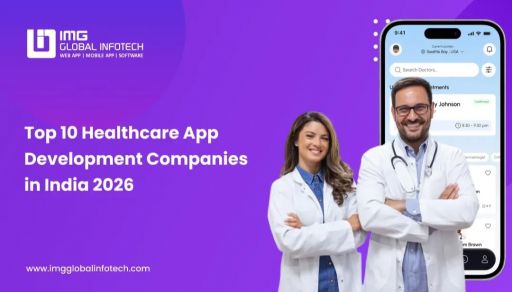 Top 10 Healthcare app development companies in India 2026
Top 10 Healthcare app development companies in India 2026
-
 Flutter for MVP Development: The Fastest Way to Build MVPs in 2026
Flutter for MVP Development: The Fastest Way to Build MVPs in 2026
-
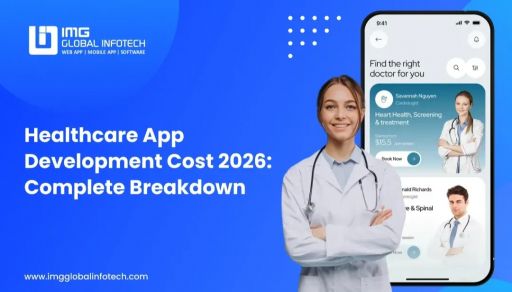 Healthcare App Development Cost 2026: Complete Breakdown
Healthcare App Development Cost 2026: Complete Breakdown
-
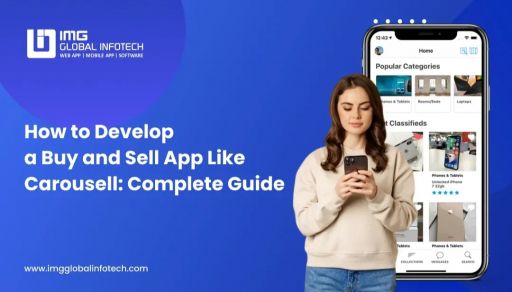 How to Develop a Buy and Sell App Like Carousell?
How to Develop a Buy and Sell App Like Carousell?
-
 Top 5 AI Applications Every Business Needs in the AI in Retail Industry
Top 5 AI Applications Every Business Needs in the AI in Retail Industry
-
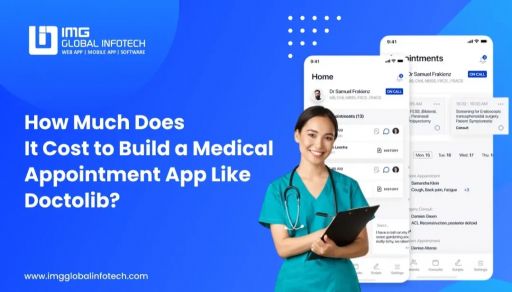 How Much Does It Cost to Build a Medical Appointment App Like Doctolib?
How Much Does It Cost to Build a Medical Appointment App Like Doctolib?
Dipti Singhal is a skilled Content Writing Specialist at IMG Global Infotech, with strong expertise in creating engaging, SEO-optimized content for various industries. She focuses on blending storytelling with effective keyword strategies to help businesses connect with their audience and improve their online visibility. Passionate about delivering high-quality content that drives real results, Dipti plays an essential role in strengthening the company’s digital presence.


